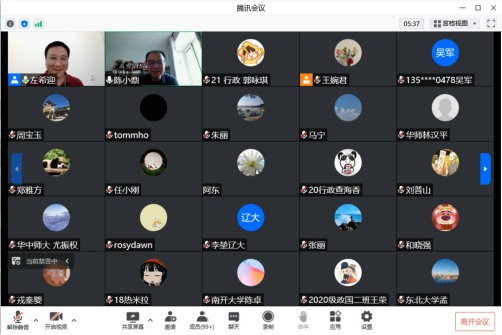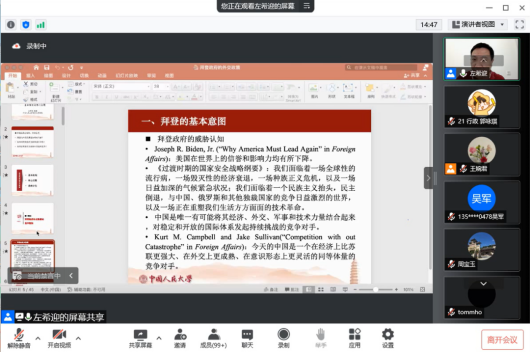On 18 July 2022, at the invitation of the School of Politics and International Relations of Lanzhou University and the InstituteforCentral Asian Studies of Lanzhou University, Professor Zuo Xiying from the School of International Relations of Renmin University of China gave an online academic lecture entitled "Foreign Policy of the Biden Administration: Basic Framework and Core Issues". The lecture was hosted by Professor Chen Xiaoding, DeputyDean of the School.

Professor Zuo Xiying discussed the Biden Administration's foreign policy in three parts: "Designing the Overall Foreign Policy Framework", "Some Core Issues in Advancing Foreign Policy" and "Strategic Assessment of the Biden Administration's Foreign Policy". At the beginning of the lecture, Professor Zuo Xiying pointed out that in the past two years since the Biden administration took office, the overall diplomatic strategy of China and the United States has one main axis and two temporal and spatial contexts. The "one main axis" is the US-China strategic competition, and the "two temporal and spatial contexts" are the New Crown epidemic and the Russia-Ukraine conflict. In the past two years, the Biden administration has been quite disciplined in its diplomatic strategy and more successful in some specific initiatives, but it is still subject to domestic constraints.
In the second part of the lecture, Professor Zuo Xiying spoke on the three core issues of the Biden administration's diplomacy, namely the Russia-Ukraine conflict, human rights policy and high-tech strategy.

Professor Zuo Xiying then provided a strategic assessment of the Biden administration's foreign policy. He pointed out that by building small circles, the Biden administration has accelerated the polarization of the world, shrunk the liberal camp and made the West more united, and the international landscape is conducive to the US taking further steps to maintain its authority. At the same time, however, the US has increasingly serious internal problems, and the inconsistency and contradictions between the government's words and actions have led to mistrust among the public and serious social divisions. Secondly, in the strategic competition between the US and China, the US does not have a complete advantage, as the two sides attack and defend each other, alternating ahead of each other, and the emergence of the dispute over development models will make the US sense of superiority gradually disappear.
At the end, Professor Zuo Xiying carefully answered the questions of the participating teachers and students. Professor Zuo Xiying explained in detail the overall framework design of foreign policy after the Biden administration took office, providing effective help for teachers and students to understand and think about the interaction between the US and the international community, which was very enlightening.
